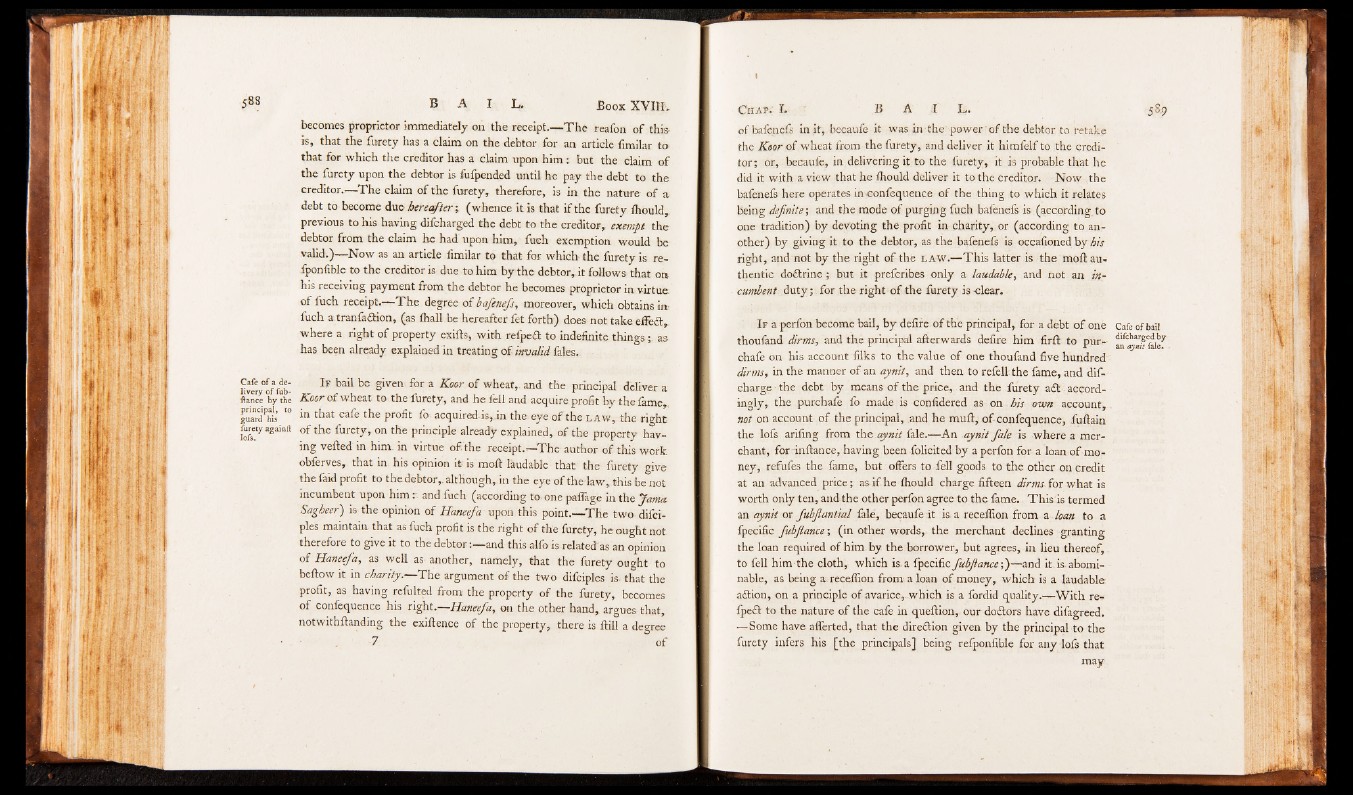
Cafe o f a delivery
of fub-
ftance by the
principal, to
guard his
furety againft
lofs.
becomes proprietor immediately on the receipt.— T h e reafon of this,
is, that the furety has a claim on the debtor for an article fimilar to
that for which the creditor has a claim upon him : but the claim of
the furety upon the debtor is fufpended until he pay the debt to the
creditor.— The claim of the furety, therefore, is in the nature of a
debt to become due hereafter; (whence it is that if the furety fhould,,
previous to his having difcharged the debt to the creditor, exempt the
debtor from the claim he had upon him, fuch exemption would be
valid.)— Now as an article fimilar to that for which the furety is re-
fponfible to the creditor is due to him by the debtor, it M ow s that on
his receiving payment from the debtor he becomes proprietor in virtue
of fuch receipt.— T h e degree of bafenefs, moreover, which obtains in
fuch a tranfadtion, (as fhall be hereafter fet forth) does, not take efledt,
where a right of property exifts, with refpedt to indefinite thingsas
has been already explained in treating of invalid Tales.
If bail be given for a Koor of wheat, and the principal deliver a
Koor of wheat to the furety, and he fell and acquire profit by the feme,
in that cafe the profit fo. acquiredis,.in the eye o f the l a w , the right
of the furety, on the principle already explained, of the property having
vetted'in. him. in virtue of. the receipt.r-The author of this work
obferves, that in his opinion it is moft laudable that the furety give
the laid profit to thedebtor,. although,.in the eye of thelaw, this be not
incumbent upon hi mand fuch (according to-one pafiage in the Jama
Sagheer) is the opinion of Haneefa upon this point.— The two difci-
ples maintain- that as fuch profit is the right of the furety, he ought not
therefore to give it to the debt or and this alfo is related-as an opinion
of Haneefa, as well as another, namely, that the furety ought to
beftow it in charity.— The argument of the two difciples is that the
profit, as having refulted from the property of the furety, becomes
o f confequence his right.— Haneefa, on the other hand, argues that,
notwithftanding the exiftence of the property, there is ftill a decree
- 7 1 of
of bafenefs in }t,.becaufe it was in the power of the debtor to retake
the Koor of wheat from the furety, and deliver it himfelf to the creditor;
or, becaufe, in delivering it to the furety, it is probable that he
did it with a view that he fhould deliver it to the Creditor. Now the
bafenefs here operates in confequence of the thing to which it relates
being definite; and the mode of purging fuch bafenefs is (according, to
one tradition) by devoting the profit in charity, or (according to another)
by giving it to the debtor, as the bafenefs is occafioned by his
right, and not by the right of the l a w .— This latter is the moft authentic
doftrine ; but it prefcribes only a laudable, and not an incumbent
duty; for the right of the furety is clear.
I f a perfon become bail, by defire of the principal, for a debt of one Cafe o f ball
thoufand dir ms, and the principal afterwards defire him firft to pur-
chafe on his. account fiiks to the value of one thoufand five hundred
dir ms, in the manner of an ay nit, and then to refell the fame, and discharge
■ the debt by means of the price, and the furety aft accordingly,
the purchafe fo made is confidered as on his own account, ,
not on account of the principal, and he muft, of confequence, fuftain
the lofs arifing from the ay nit fale.— An aynit fate is where a merchant,
for inftance, having been Solicited by a perfon for a loan of money,
refufes the fame, but offers to fell goods to the other on credit
at an advanced price; as if he fhould charge fifteen dirms for what is
worth only ten, and the other perfon agree to the fame.. This is termed
an aynit or fubfiantial fale, becaufe i t is a receffion from a loan to a
fpecific fubfiance-, (in other words, the merchant declines granting
the loan required of him by the borrower, but agrees, in lieu thereof,
to fell him the cloth, which is.a fpecific fubfiance-,)— and it is abominable,
as being a. receffion from'a loan of money, which is a laudable
adtion, on a principle of avarice, which is a fordid quality.— With refpedt
to the nature of the cafe in queftion, our dodtors have difagreed.
— Some have afferted, that the diredtion given by the principal to the
furety infers his [the principals] being refponfible for any lofs that
may